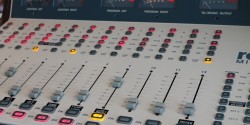Last week, the D.C. Circuit of the United States Court of Appeals affirmed (see the full decision here) the Copyright Royalty Board (CRB)’s decision regarding the establishment of webcasting royalty rates, rejecting an appeal by college radio organization, the Intercollegiate Broadcasting System (IBS). These webcasting royalties are paid to musical performers who appear on the sound recordings played by any US radio station on its internet stream. In the decision, Chief Judge Garland writes,
Intercollegiate Broadcasting System, Inc., appeals a determination by the Copyright Royalty Board setting royalty rates for webcasting. Three years ago, we vacated and remanded the Board’s prior determination on this subject, concluding that its members had been appointed in violation of the Constitution’s Appointments Clause. Thereafter, the Librarian of Congress appointed a new Board, which made the determination at issue here. Intercollegiate contends that the new Board’s determination again violated the Appointments Clause because it was tainted by the previous Board’s decision. The appellant also disputes the merits of the Board’s determination. For the reasons set forth below, we reject both challenges.”
In effect the IBS argued that because the previous incarnation of CRB was not properly constituted, any of its decisions required essentially a full and thorough re-review, including new hearings, in order to be constitutional. Instead, the new CRB had only done a review of the case before deciding to uphold the prior decision. However, the Court found that review to be adequate, therefore also upholding the board’s decision leaving the fees in place.
On Radio Survivor we’ve been covering the ins and outs of webcasting royalty rates. Back in December, 2010, the Copyright Royalty Board released its Initial Determination of Rates and Terms for the period 2011-2015 (these terms were finalized in 2011). Within those terms were rates for student broadcasters based on a settlement agreement made between another college radio organization, College Broadcasters Inc. (CBI) and SoundExchange (the third-party group that collects and distributes royalties to artists and copyright holders). Although both CBI and IBS work to advocate for college radio stations, the groups have different perspectives on webcasting rates. IBS expressed concerns about those rates and ultimately submitted a series of appeals.
In addition to IBS’ arguments about the procedures related to the appointment of the Copyright Royalty Board, the group also protested the rates set by the Board (a minimum flat fee for webcasting royalties of $500 a year), arguing that many college radio stations have tiny budgets and cannot afford that high a rate. According to the decision, IBS proposed lower rates for student broadcasters, specifically asking for “…two new categories of noncommercial webcasters: ‘small’ noncommercial webcasters (defined as noncommercial webcasters with usage up to 15,914 ATH [aggregate tuning hours] per month) and ‘very small’ noncommercial webcasters (defined as noncommercial webcasters with usage up to 6,365 ATH per month).”
Within IBS’ proposal, there was a request for fees to be set at $20 a year for very small noncommercial webcasters and $50 a year for small noncommercial webcasters. In its decision, the U.S. Court of Appeals responded that,
Intercollegiate did not offer testimony from any member claiming to be adversely affected by the $500 fee, ‘in spite of the Judges’ invitation to do so.’ Nor did it ‘offer testimony from any entity that demonstrably qualified as a “small” or “very small” noncommercial webcaster.’Indeed, the Board noted that Intercollegiate’s assertion was ‘undercut by testimony that some of these same entities pay IBS close to $500 annually for membership dues and fees for attending conferences.'”
Additionally, the U.S. Court of Appeals decision cites CBI’s agreement with SoundExchange as evidence that student broadcasters can afford the $500 a year rate. It also argues that SoundExchange’s own administrative fees are more than this minimum rate:
By contrast, the Board found affirmative evidence that noncommercial webcasters were indeed both ‘able and willing to pay the proposed fees.’ The most persuasive such evidence — as well as support for a $500 minimum fee as the amount that willing buyers and sellers would negotiate — was that College Broadcasters, an organization representing noncommercial educational broadcasters, had already reached a voluntary agreement with SoundExchange (the nonprofit entity that collects statutory royalties and distributes them to the copyright holders) that included the same fee.
…Finally, the Board also relied on testimony from SoundExchange’s chief operating officer, who testified that its average annual administrative cost per station or channel was approximately $825.”
This decision serves as a reminder that webcasters are required to pay the existing royalty rates. As Paul and I discussed in this week’s Radio Survivor Podcast, there has been some conflicting information about whether or not IBS stations needed to continue paying annual fees to SoundExchange while the case was being decided. It should now be clear that fees are required for all stations. In the meantime, College Broadcasters Inc. (CBI), has been operating under its existing agreement (in place until the end of 2015) and also penned a new settlement with SoundExchange last year, setting webcasting royalty rates and reporting requirements for its student broadcasters beginning in 2016.
It’s important for all webcasters to not only be aware of webcasting fees and regulations, but to also monitor any proposed changes on the horizon in order to plan for annual expenses and also to ensure compliance. In the early days of the Internet, it was a bit of the wild west and there was the perception that it was essentially free to run an online radio station. However, that’s not the case and anyone running an online radio station needs to be clear about responsibilities related to licensing fees. For more details, see SoundExchange’s website for a breakdown of the different fee structures for various types of webcasters.



